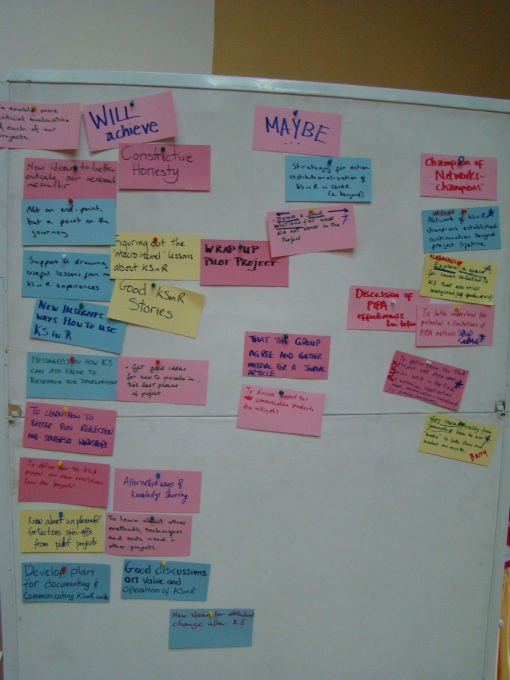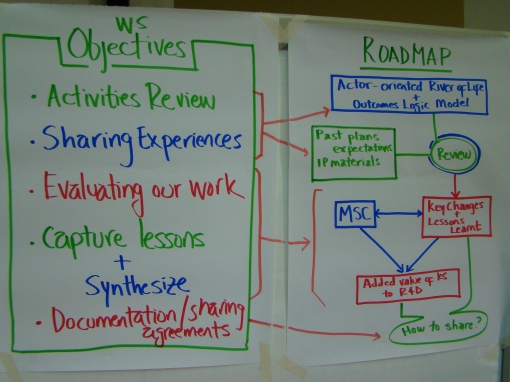In the Knowledge Sharing in Research(KSinR) project, the 6 Pilot Projects have be en piloting a range of knowledge sharing approaches in particular research projects, programs or domains. Their experiences have proven to be as diverse and interesting as their initially proposed approaches. Many of the Pilots have carried out a wide range of activities and experienced many things in using knowledge sharing in research.
en piloting a range of knowledge sharing approaches in particular research projects, programs or domains. Their experiences have proven to be as diverse and interesting as their initially proposed approaches. Many of the Pilots have carried out a wide range of activities and experienced many things in using knowledge sharing in research.
In the previous exercises of the KSinR Synthesis Workshop the participants had been asked to describe and evaluate the whole host of activities, outputs and outcomes of their Projects.
In this session the Pilot projects were asked to present the most significant change th at they think has/had happened in using knowledge sharing in their research projects or domains. This was to be done through the use of the ‘Most Significant Change story approach’. Participants had been informed of this prior to arriving at the workshop and an explanation had been given on Day 1 to allow them to prepare their stories.
at they think has/had happened in using knowledge sharing in their research projects or domains. This was to be done through the use of the ‘Most Significant Change story approach’. Participants had been informed of this prior to arriving at the workshop and an explanation had been given on Day 1 to allow them to prepare their stories.
The question asked was:
” Looking back over time of implementing knowledge sharing philosophies and approaches in your research project, what do you think was the most significant change in the research project?”
On Day 2 the workshop moved out into the ILRI Campus gardens to present and listen to stories of most significant change from using knowledge sharing approaches in research.
The ‘most significant change’ stories consisted of:
- From the IWMI Pilot Project ‘ Learning Alliances for Wastewater Agriculture and Sanitation for Poverty Alleviation (LA WASPA)’ the story presented by Alexandra Evans was about–
- improved links between hygiene and wastewater use in agriculture
- all research and actions that took place were known about and understood by all stakeholders involved
- can work much easier with the various stakeholders after this experience
 2. From the IRRI Pilot Project ‘ Knowledge Management harmonising research output” the story presented by Ben Samson was about—
2. From the IRRI Pilot Project ‘ Knowledge Management harmonising research output” the story presented by Ben Samson was about—
- the initial workshop bringing together stakeholders brought about increased awareness and change in attitude of the various actors involved
- the workshop provided a meeting point for people who needed something and those who could meet that need.
3. From the WorldFish Pilot Project ‘ Applying KS tools to Impact Monitoring and Project M&E” the story presented by Natasja Sheriff was about—
- the way we (usually) do M&E in our projects is not very responsive
- this Pilot Project provided an opportunity for Natasja to try something new out for her project and created a space for her to increase her own learning which she could then apply to other projects, share with others, and hope to influence how M&E is carried out in her institute
4. From the IWMI Pilot Project ‘ A Knowledge Sharing Approach to Safe Food”
—–a story presented by Tonya Schuetz was about—
- a key thing that was done through this project focused on knowledge sharing was to increase and improve interactions with user groups
- we sought feedback from stakeholders at many stages in the research process
- through talking to potential users of the research results about the results and how messages could be effectively formulated helped the project to develop effective messages which lead to the achievement of early adoption of project recommended practices
- took advantage of key opportunities such as the revision of the city by-laws and irrigation
 policy which only happens every ten years
policy which only happens every ten years
- important to implement knowledge sharing throughout the research process
—–a story presented by Phillip Amoah was about—
- we learned that it was necessary to work on a (national) policy level as well in order to support local action messages that we were trying to promote amongst farmers and caterers on the ground
- it was important to work closely with the relevant ministries–in this case Ministry of Agriculture
 5. From the CIFOR Pilot Project ‘Shared Learning to Enhance Research Priority Assessment Practices’ the story presented by David Raitzer was about—
5. From the CIFOR Pilot Project ‘Shared Learning to Enhance Research Priority Assessment Practices’ the story presented by David Raitzer was about—
- ex-ante has not previously had any systematic support
- this was the first attempt to pull together methods and experiences and to find ways to give them visibility
- there has been as a result of this work of this Pilot to share knowledge on this subject matter, been more attention to ex-ante and priority setting amongst those doing impact assessment
6. From the ICARDA Pilot Project ‘International Farmers Conference’ the story presented by Alessandra Galie was about—
- There was empowerment of women farmers through this process. For example Ruqeia a young female farmer was at first nervous to present her story but after she did she was congratulated by many participants of her good agricultural knowledge and skills. She then took the initiative to approach an FAO representative to ask for help on Integrated Pest Management which he had presented on.
- The knowledge of women farmers was more appreciated and a greater recognition was gained in the institute that more efforts need to be made to include this in the Participatory Plant Breeding Program
- The implementers became more aware of the fact that knowledge sharing approaches may need to be tailored to work with marginalised groups-thus it is necessary to refine approaches to be appropriate to varying types, uses, needs etc of knowledge by different groups.
For what happened next..stay tuned for the next blog post!





























